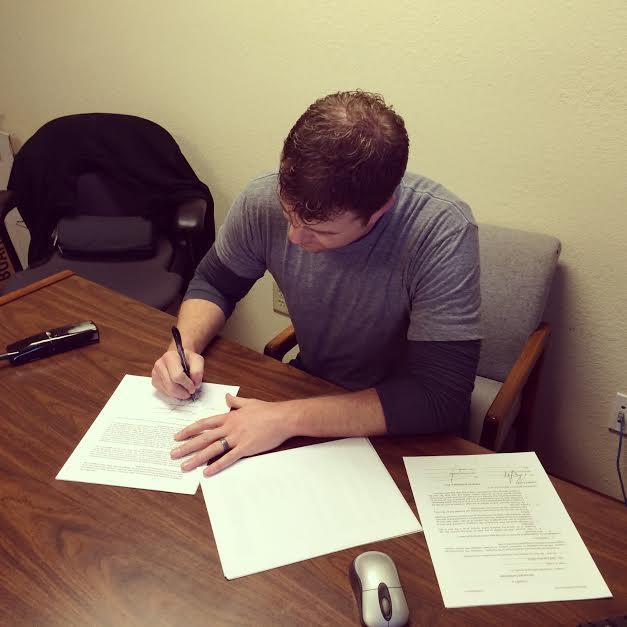18 Aug Caught in the Quicksand Part 1: A Vanishing Victory
It was 2013 and I was elated. My company, Negri Electronics, had just done $10 million in sales in 2012, and we were poised to double that this year. I was standing on top of the mountain of success created by my own hands. So, you can imagine my surprise when only 18 months later, I was bankrupt.
Summiting My Professional Everest
Ever hear of the saying, “rock bottom”? Well, I have discovered that the bottom is not rock. Instead, this deep pit that many of us have the misfortune of falling into (whether as a consequence of our own choices or just bad luck) is, in fact, quicksand. There literally is no bottom, and, just when you think you’re starting to crawl out of it, you are pulled back into the quagmire.
As 2013 began, I found myself at the summit of my career. My company had just done $10 million in sales the previous year, and we were on track to double that the following year. Negri Electronics was my magnum opus — the largest private wireless electronics eCommerce company in the country. Its success, along with the joy my new marriage brought me, led me to believe that I had finally arrived at the pinnacle of success and happiness. I was living the Dream!
To continue to build on that dream, my brother and VP, Philip, and I decided our first goal of the new year was for Negri Electronics to raise money and really scale the business up. However, this was on the tail-end of the recession and banks weren’t lending money to anyone. I didn’t have any wealthy friends or family, nor did I have a network of venture capitalists or other investors to turn to. But, as we set out to raise money, something interesting happened — we received a few offers to purchase the company! So, after a few candid discussions with Philip and a few advisors, we decided that we should field purchase offers and eventually sell Negri Electronics. After evaluating a few offers, we finally accepted one in May that, after negotiations, was close enough to the purchase price we were looking for.

I knew that selling a company was a lengthy process, but I wanted to make sure the deal was completed by the end of the year so that it didn’t drag on over the holidays. I knew the odds were that the longer these things took, the more likely they would die. I pushed to expedite the process. After gathering all the information on the company’s assets, due diligence on the buyers, providing seller disclosures, and working with attorneys on the contract, I sat in my father’s office on Christmas Eve and signed the paperwork, completing the sale. Selling my company for $7.25 million was the pinnacle of my professional career! Little did I know, I had made critical errors that I wouldn’t discover until later.
The first and biggest error was selling my company to begin with — we should have raised money and scaled the business. The second error was I shouldn’t have sold my company to that buyer. And third, I should not have agreed to a four-year payment schedule. In my excitement to sell, I had accepted a contract that called for an upfront payment of $500,000 and then a quarterly payment schedule ending in four years, commonly known as an earn-out. At the time, I was ecstatic; as the months went by, I discovered just how fatal an error I had made.
Initially, all seemed fine with the sale. As scheduled, a month later, I received the first tranche and instead of waking up and going to work, I spent the morning on the golf course. Standing at the 1st tee box, I had an almost unsettling feeling — this was the first Monday in seven years I hadn’t gone to work.
A Rocky Descent
It didn’t take long for the ground to fall out from beneath me. I began to hear from employees and vendors that things were not going well. The rumors were that payments weren’t being made and an email circulated about possibly missing payroll. The rumors were true, and the first setback from the sale of my company hit. After they paid me the tranche in April, they took out a line of credit for $400,000 from a bank in Miami. They said they were moving to a corporate reselling business model in order to grow the business. They assured me that getting the line of credit had nothing to do with paying me for the sale of the company. I was aware of the loan and felt confident that the buyers would know how to put it to work; I was unconcerned at the time. However, the bank wouldn’t proceed with the loan unless I subordinated my shares. That meant that if the buyers defaulted, the shares of Negri Electronics would go to the bank, not back to me. Obviously, this was extremely risky, so I insisted on an expedited payment schedule, which they accepted.
When July rolled around, I was expecting another tranche of capital, but on July 3, while I was visiting my family, the buyers told me they could not make another payment. I was shocked! They had a wealthy family, backers, cash on hand, over two million in accounts receivable, and a $400,000 line of credit. I told them they had 30 days to make the payment — which they never did. What an embarrassment, I thought. I had told everyone in my life that I had just sold my company, and now . . . I looked like a failure!
To say I was a bit panicked would be an understatement. I knew I needed to act fast if I wanted to recover any of the $6.5 million that was still due, so after resolution talks with the buyers stalled, I hired an experienced attorney to help me collect the contracted amount of the sale . . . but not without a healthy retainer!
Months later, I learned that the buyers defaulted on the line of credit after only five months. The bank, now the sole shareholder, asked me to run the company for them; however, they didn’t want to pay me anything to do so. According to the banker, “You already received money for the purchase of the company. Why would you need a salary to run it?”
I was blown away by her lack of respect and fairness. Negotiations stretched on for months as the bankers tried to convince me that I was obligated to work for free, and with a very small budget, in order to make up for the lost time and money the buyers had caused. Conversations fizzled out and we went our separate ways.
The last two months of 2014 were stressful, as holiday months normally are, but this time everything was elevated. I couldn’t address the issues created by zero payments or income coming in and having to now pay the creditors that my buyers owed. The sale of my company was quickly changing from the pinnacle of my success to a financial disaster. With no other options, I filed a lawsuit against the buyers on New Year’s Eve, 2014. One year is all it took to turn my life upside down!
And, what I didn’t know then, was just how bad it was going to get . . .
[Part 2]
